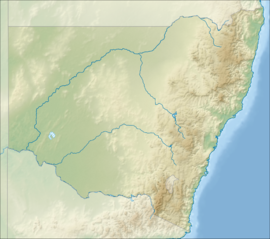Mount Hyland Nature Reserve
| Mount Hyland Nature Reserve New South Wales | |
|---|---|
 Doryphora sassafras in the reserve. | |
| Nearest town or city | Dorrigo |
| Coordinates | 30°09′36″S 152°26′42″E / 30.16000°S 152.44500°E |
| Established | June 1984[1] |
| Area | 25.19 km2 (9.7 sq mi)[1] |
| Managing authorities | NSW National Parks and Wildlife Service |
| Website | Mount Hyland Nature Reserve |
| See also | Protected areas of New South Wales |
The Mount Hyland Nature Reserve is a protected nature reserve that is located in the New England region of New South Wales, in eastern Australia. The 2,519-hectare (6,220-acre) reserve is situated approximately 35 kilometres (22 mi) west of Dorrigo.
The reserve is part of the New England Group of the UNESCO World Heritage–listed Gondwana Rainforests of Australia, inscribed in 1986 and added to the Australian National Heritage List in 2007.[2][3]
Features
[edit]Mount Hyland is a triple peaked mountain, some 400 metres (1,300 ft) higher than the surrounding plain. The highest point is 1,434 metres (4,705 ft) above sea level.
The temperate rainforest is of scientific interest, being a remnant of former Gondwana forests that once covered Australia. The rainforest lacks the Antarctic Beech and is dominated by Common Sassafras and other species.
This remote hotspot of biodiversity is home to many endangered animal species. Thus, in the early 1980s, the Hastings River mouse and rare pouched frog, which were believed to be extinct, were rediscovered.[4]
Molluscs
[edit]Indigenous molluscs at the reserve include the following species: Triboniophorus graeffei, Terrycarlessia turbinata, Protorugosa alpica, Austrorhytida harrietae, Parmavitrina planilabris, Mysticarion porrectus, Brazieresta larreyi, Thersites novaehollandiae and Austrochloritis sp.[5]
See also
[edit]References
[edit]- ^ a b "Mount Hyland Nature Reserve: Park management". Office of Environment and Heritage. Government of New South Wales. Retrieved 28 September 2014.
- ^ Adam, Paul (4 September 1987). New South Wales Rainforests. The Service. p. 67. ISBN 0-7305-2075-7.
{{cite book}}:|work=ignored (help) - ^ "Gondwana Rainforests of Australia". World Heritage List. UNESCO. Retrieved 9 June 2008.
- ^ "Mount Hyland Nature Reserve". NSW National Parks. Retrieved 8 November 2021.
- ^ Australian Museum Field trip. January 2018. Authors; Dr Frank Koehler, Michael Shea & Guanglong Xie
External links
[edit]- Mount Hyland Nature Reserve and Mount Hyland State Conservation Area: Plan of management (PDF) (PDF). Government of New South Wales. 19 May 2009. ISBN 978-1-74232-329-9.
{{cite book}}:|work=ignored (help)


